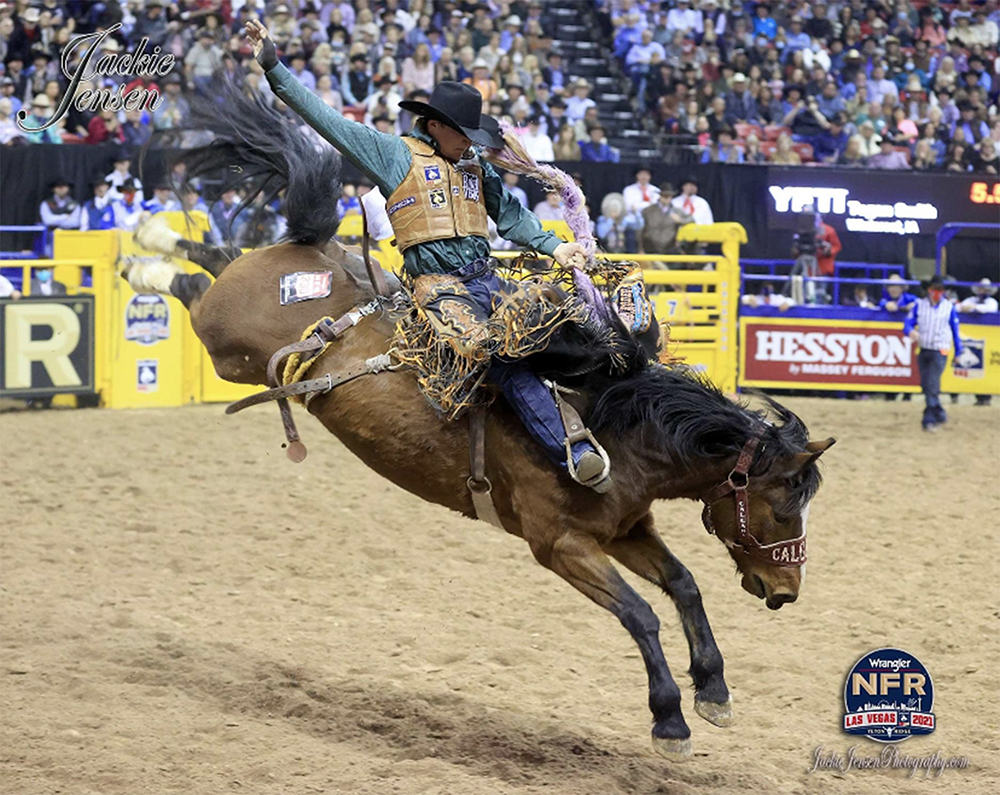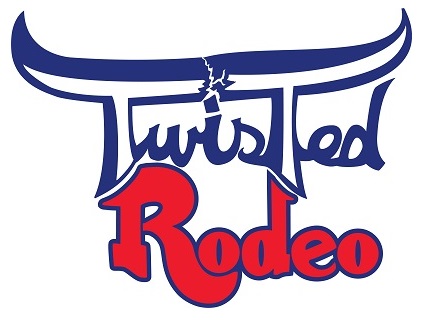
(PHOTO BY JACKIE JENSEN)
Tegan Smith carrying a family tradition into an elite rodeo status
The state of Iowa isn’t quite as well known in the rodeo world as others.
Cinch cowboy Tegan Smith is trying to change that.
The 24-year-old saddle bronc rider has one qualification to the National Finals Rodeo, the sport’s grand finale that takes place in Las Vegas every December. He earned his trip last season and promptly found success. He won the third go-round and finished 10th in the final world standings.
“When I was growing up getting on the mini bulls and steers when I was in youth rodeo, Dad and I talked and laughed that we were riding bulls, but we’re going to ride broncs some day,” said Smith of Winterset, Iowa, a community of 5,300 not far from Des Moines. “I was 14. I got on that first one, and it rared out of (the chute) and loped, and I stayed on. I knew then that this is what I’m going to do.”
There’s joy in his voice when he talks about his youth. His grandfather rode broncs and bulls, and his dad and uncle also competed in rodeo.
“It’s just what we’re supposed to do,” he said. “I’ve always rode bulls and broncs. I did it through high school. I rode bulls in college and made the college finals in bull riding. I won the all-around title in the Southwest Region because of bull riding.
“Then it was time to go rodeoing (for a living), and I always knew I wanted to be a bronc rider.”
Iowa is best known for its political caucuses, corn, the Hawkeyes and the Cyclones, but there are some pretty handy cowboys. Smith now travels the rodeo trail with Wade Sundell, the 2018 world champion from Boxholm, Iowa. Over the last six seasons, there have been three Iowa-born cowboys that have won a combined five Montana Silversmiths gold buckles: Sundell, three-time bareback riding titlist Tim O’Connell from Zwingle and 2020 steer wrestling champ Jacob Edler from State Center.
Smith’s first cousin, Riggin, also won the 2019 National Intercollegiate Rodeo Association’s saddle bronc riding championship while competing at Clarendon (Texas) College. Both Smith boys attended that college, coached by three-time NFR qualifier Bret Franks. That year that his cousin claimed the title, Tegan Smith finished third at the College National Finals Rodeo.
“We went and checked out all those other schools,” Tegan Smith said of him and his family. “Dad always said he wished he would have went south to go to college to rodeo, further away from home. I was either going to school there to rodeo for Bret Franks or Panola (Texas) College to rodeo for Jeff Collins (the 2000 world champion bareback rider).
“That facility at Clarendon was phenomenal, and Bret had the perfect set of practice horses. Jeff and Bret are good friends, so you were actually getting coached by both of them.”
There was also a little history at Clarendon. Fellow Cinch endorsee Wyatt Casper had won the college title for the college in 2016, so that just added to the intrigue.
“He was just some Oklahoma team roper who decided to be a bronc rider, and now he’s one of the best in the world,” Smith said.
It’s the process that comes with learning through every phase of life. Smith is on the verge of becoming one of ProRodeo’s elite bronc riders. He’s played on the biggest stages of the sport. When necessary, he’ll still reach out to his mentors for assistance. He travels with one in Sundell, but he doesn’t mind contacting his father or Franks or anyone else with advice.
“Right before the spring started this year, I went back over to Clarendon and got on some practice horses,” he said. “Some were still those same old good ones I was excited to get on every week. Bret was great when I was going to college there, but when I finally left, it made me realize what he was talking about. It was all parts of life, not even riding broncs.
“Nobody from Iowa had gone to the National Finals in bronc riding that I would know, but Wade did it. Once I got on the road and realized how hard it was, I had a lot of respect for him. Now, he’s a nine-time National Finals qualifier and a world champion. It’s crazy that he’s done it that good and for that many years.”
The yellow bucking chutes at the NFR offer a glowing view of the sport’s championship event, but they also serve as motivation for young cowboys who want to play the game at its highest level. Smith had dreamed of the moment when a surge of electricity burst out of one of those chutes with him on the back of it.
“It was the coolest experience,” Smith said. “When you’re a young guy starting out, that’s what you dream of. I always told myself I wasn’t going into the Thomas & Mack until I made it, so I got to hold myself to that. Wade and I walked down (the alley that leads to the arena floor) carrying our stuff in. We walked to the out-gate. You look around, and you realize you’ve done it.
“It makes all the hard work, all the stress, all the miles make sense.”
The hard work started 10 years ago when he was still a teenager. Over time, he’s adjusted his approach and improved along the way. He’s still doing that. How much has he improved since turning pro in 2018?
“You think you ride good, but then you watch all these other guys straight-up beating you, and you have to ride better,” he said. “You don’t realize you’re doing it, but mentally you’re just getting better every day. I’d say the biggest reasons for getting better is mental and in your own maturity.”
Consistency is key when it comes to competition, especially in rodeo. There are times through the summer run that bronc busters may get on two horses a day, so making solid spur rides day in and day out is critical.
“It’s the same thing, different day,” Smith said. “You’ve got to draw good, but when you don’t, you’ve got to ride better. You’ve got to keep the ball rolling. We’ve got a 100-rodeo count; if you can win $1,000 at 100 rodeos, that should get you to the finals.”
He wants to return to those yellow bucking chutes. He knows that it takes to get there, and he’s watched one of his traveling partners, Australian Jake Finlay, just miss out on making it to ProRodeo’s marquee event. All those things combined helps him keep a strong mental approach to a hectic schedule.
“He’s been (17th) in the world before, just missing out on making it,” he said, noting that only the top 15 at the end of the regular season advance to the NFR. “He said it was the hardest thing he had to go through. Just (two spots) from your lifelong goal. That helped me by telling me what it’s like to be on the outside looking in.”
That’s why having a solid buddy group is such an important part of rodeo. Not only do they share the expenses that come with the many miles between one rodeo and another, but they share a bond that can be helpful when used in the right capacity.
“They really help with the mental game,” Smith said. “If your traveling partners are weak, you’re going to be weak. If your traveling partner is positive, you’re always positive.
“We build off each other, and we make each other better.”
It’s certainly a key to success.
